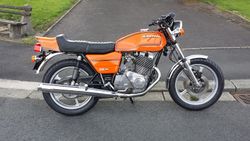Laverda 500 Alpino
The Laverda 500 Alpino was a air cooled, four stroke, parallel twin cylinders Naked motorcycle produced by Laverda between 1980 and 1984. Max torque was 33.19 ft/lbs (45.0 Nm) @ 5200 RPM. Claimed horsepower was 43.99 HP (32.8 KW) @ 9500 RPM.
 |
|
| 'Laverda 500 Alpino' | |
| Manufacturer | [[Laverda]] |
|---|---|
| Production | 1980 - 1984 |
| Class | [[:Category:Naked motorcycles|Naked]] [[Category:Naked motorcycles]] |
| Engine | air cooled, four stroke, parallel twin cylinders |
| Bore / Stroke | 71.9mm x 71.9mm |
| Compression ratio | 9.6:1 |
| Horsepower | 43.99 HP (32.8 KW) @ 9500RPM |
| Torque | 33.19 ft/lbs (45.0 Nm) @ 5200RPM |
| Fuel System | 2x32mm DellOrto Carburetors |
| Transmission | Gear box: 6-speed, manual Final Drive: chain |
| Suspension | Front: Marzocchi telescopic forks Rear: Marzocchi 5-way adjustable shocks |
| Brakes | Front: 2x260mm discs 2 piston calipers Rear: Single 260mm disc 1 piston caliper |
| Front Tire | 90/90-17 |
| Rear Tire | 110/90-18 |
| Weight | 175.0 kg (wet) |
| Manuals | Service Manual |
Engine
A 71.9mm bore x 71.9mm stroke result in a displacement of just 497.0 cubic centimeters.
Drive
The bike has a 6-speed, manual transmission.
Chassis
It came with a 90/90-17 front tire and a 110/90-18 rear tire. Stopping was achieved via 2x260mm discs 2 piston calipers in the front and a Single 260mm disc 1 piston caliper in the rear. The front suspension was a Marzocchi telescopic forks while the rear was equipped with a Marzocchi 5-way adjustable shocks.
1980 Laverda 500 Alpino
If you are a rider on the market for an agile and maneuverable naked machine, than the 1980 MY Laverda 500 Alpino may be the right choice for you. It sports an air-cooled, four-stroke, 497cc, parallel twin powerhouse paired to a six-speed manual transmission that can produce 44 horsepower and 45 Nm of torque. In addition, it comes with a Marzocchi telescopic fork and Marzocchi five-way adjustable rear shocks, which not only increase its maneuverability, but also make for a more comfortable machine.
1981 Laverda 500 Alpino
The 1981 MY Laverda 500 Alpino addresses naked fans that want a more agile, maneuverable, Italian built machine. It sports an air-cooled, four-stroke, 497cc, parallel twin powerplant paired to a six-speed manual transmission and can produce 44 horsepower and 45 Nm of torque. Other features include lightweight, five-spoked wheels, dual front disc brakes, telescopic forks and rear dual shocks, as well as an optional small windscreen.
1982 Laverda 500 Alpino
The 1982 MY Laverda 500 Alpino sports an air-cooled, four-stroke, 497cc, parallel twin engine mated to a six-speed manual transmission, that produces 44 horsepower and 45 Nm of torque. It has been designed for riders who want a more agile and maneuverable naked machine, and comes standard with a race-derived suspension package, composed of a hydraulic telescopic front fork and dual shocks in the rear, which not only aid in maneuverability, but also make for a more comfortable machine.
1983 Laverda 500 Alpino
For riders on the market for an agile and powerful naked machine, the Italians from Laverda have launched the 1983 MY 500 Alpino, a two-wheeler that promises performance and smiles no matter where one decides to ride it, whether for a daily commute or a weekend stroll through the countryside. At its heart lies an air-cooled, four-stroke, 497cc, parallel twin powerhouse paired to a six-speed manual transmission, and can produce 44 horsepower and 45 Nm of torque.
1984 Laverda 500 Alpino
When it comes to agile naked machines, it doesn't get much better than the 1984 MY Laverda 500 Alpino, with its air-cooled, four-stroke, 497cc, parallel twin cylinder powerplant paired to a six-speed manual transmission, and can produce a claimed 44 horsepower and 45 Nm of torque. In addition, it comes with dual front disc brakes and a single disc brake in the back, hydraulic telescopic forks, dual shock absorbers as a rear suspension and it tips the scale at only 175 kg (386 lbs).